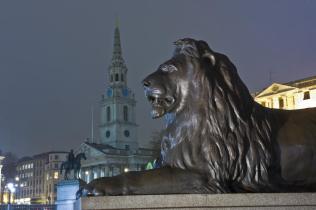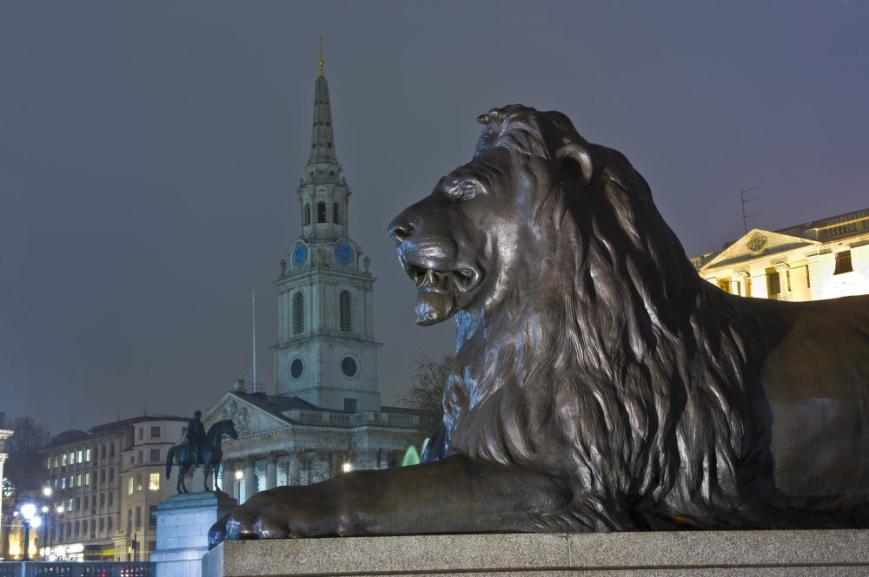I seem to find myself more and more perturbed with irrational and unbalanced news coverage of recent events.

I sense that rational, sane and wholly democratic views could be so easily manipulated in an atmosphere of hyperbole and paranoia. So, as I was thinking about that I dusted off and updated a short story I worked on a while ago that aimed to look at what might happen if the inmates got to run the asylum… (On a personal note, it isn’t real, it’s a fictional story and is not meant to upset, annoy or incite. It is meant to make you think… Your comments are welcome.)
Fight Fire With Fire
The mane and broad back of the lion twinkled with small flecks of frost. I squished left and right trying to keep my balance and eventually slid down the side of the cold bronze and sat on the outstretched paw. My dad steadied me with his arm, gave my hair a quick fuzzle with his big hand and smiled down at me. Funny the things that stick in your mind. But I shouldn’t be surprised. That whole morning is vivid.
“You okay son?”
“Yeah Dad, I’m good.”
“Can you still see?”
“Yeah.”
“Well, if you can’t you just ask and I’ll lift you up on my shoulders. Okay?”
 I nodded and gazed back out over the square. After all the passing years I know that piece of ground so well, but back then I was seeing it with new eyes. The neon floodlights picked out the smallest detail in stark, hygienic light. The hundreds of people taking their seats in the raised stands, the tightly packed triangles and circles of standing room only. The covered fountains to left and right, the shrouded statues on their plinths and the large earthen bank in front of the steps that would normally have led to the Portrait Gallery. The thin, white posts set just to the front of the earth bank gave off four-way shadows in the cross fall of the floodlights. A loud click and the whole scene plunged into near darkness. I flinched back against my Dad’s leg.
I nodded and gazed back out over the square. After all the passing years I know that piece of ground so well, but back then I was seeing it with new eyes. The neon floodlights picked out the smallest detail in stark, hygienic light. The hundreds of people taking their seats in the raised stands, the tightly packed triangles and circles of standing room only. The covered fountains to left and right, the shrouded statues on their plinths and the large earthen bank in front of the steps that would normally have led to the Portrait Gallery. The thin, white posts set just to the front of the earth bank gave off four-way shadows in the cross fall of the floodlights. A loud click and the whole scene plunged into near darkness. I flinched back against my Dad’s leg.
“It’s okay, just the sensors kicking in. The sun’s coming up. Not long now,” he said as he turned and looked over his shoulder.
I relaxed and as my eyes adjusted to the sudden greyness I watched the long shadow of the old column carve itself out, freed by the lemon pastel of a May morning sunrise. As the light strengthened I imagined the shadow was a giant’s sundial pointing to ten o’clock. That giant’s clock was fast. It wasn’t even six yet. I’d never been up so early. As the sky lightened my Dad nudged me with his foot and nodded up towards the surrounding buildings. On each rooftop were teams of two, sometimes three, people. Equally spaced right around the square. I was still trying to guess what they were doing when the noise of vehicles dragged me back to the ground.
Two vehicles, their engines sounding unnaturally loud, swung into the square from just behind me. One was like an armoured police van but painted in the disrupted pattern of the military. The second resembled a single-deck bus but it too was painted in the same pattern including the windows. The bus slewed off to the right between the rows of spectators and the armoured car moved to near the earth bank. As soon as it stopped the rear doors sprung open and two women in uniforms almost the same colour as the van jumped out. I could see stumpy machine guns hanging across their chests. They stood back, raised their weapons and pointed them into the back of the van. The driver and passenger got out of the cab and walked round to the rear doors. The passenger, a tall blonde man, also had a short machine gun. I thought it looked too small for him. The driver didn’t seem to have any guns at all, but he had a pronounced Welsh accent that carried over the subdued murmurs and whispered comments of the crowd.
“Out! Now!”
I felt my Dad’s hand on my shoulder; he lent down and spoke gently to my ear “Remember this James. Remember your first sight of these people. Never forget it.”
I wiggled up on the paw to get the best view. The cold of the morning was replaced with a surge of heat inside me. I couldn’t have been tenser, more thrilled or awed had the lion’s paw come to life and lifted me up.
Awkwardly, with legs and hands shackled, two men climbed down, almost fell, from the van. They were ushered silently by flicks of muzzles to step to the side. Two more followed. All were dressed in bright blue jumpsuits. I strained my eyes to look at their faces and was shocked. They were so much younger than I had expected. They looked about the same age as my eldest brother. He was 19, just 7 years older than me. Later I was to reflect and realise that it shouldn’t have shocked me. Alistair was off fighting for us and here were men; boys, the same age, fighting for them.
They stood quietly, their heads uncovered, their beards short, neatly trimmed, their eyes blinking in the rays of the sun. Then they were out of sight. Ushered behind the van by more flicks of the muzzles.
I relaxed a little onto the paw and realised for the first time that the bus doors had opened and 12 soldiers, some men, some women, had stepped out into the open expanse of the square. I also noticed the quiet. All the whispers and murmurs had stopped. In this mute theatre every disturbance was amplified. The soft rubber soles of the soldiers boots as they formed up into two lines, the brushing friction of their rifle straps as they swung them off their shoulders, the faint clicks and snaps of weapons being checked and prepared. Sounds so familiar to me now, but so alien, strange and thrilling then.
The Welsh driver, his tall passenger and the two women soldiers got back into their van and the engine turned over. Its noise crushed everything else. I watched as it pulled away to one side of the square and then my ears rang silent again as the engine was shut off. My gaze returned to the front and my breath caught in my throat. That singular moment in my life remembered now half a century on, but as vivid as if it had been this morning. The coursing of an emotion I had never felt before but would feel many times after. Intense, burning, fearfully encompassing, shame.
An old man in a long flowing robe stepped forward from the VIP seating area. He carried a book and stopped at each of the four young men in turn. Although he spoke so quietly that it was inaudible to me it seemed that as each conversation ended the younger man held his head a little higher. I remember wondering about that. But I didn’t dwell on it. Not then.
A boy of about my age asked his father, too loudly in my opinion, what the men were called.
“Targets.” The father had laughed and some of the other men and women who stood around them had joined in.
I didn’t understand the joke but I felt sick in the pit of my stomach at their laughter. Movement in the square brought a renewed hush. The Welsh driver had come back into the middle. He walked from post to post and placed a hood over each of the young men’s heads before marching smartly away. The dozen soldiers in their two lines came to attention, their soft soles making little noise. No yelled commands, no parade ground stamping. Just quiet efficiency. They moved like twelve puppets with shared strings. Then they stood, rock-solid. Still.
A women Officer stepped from the bus and checked her watch. She nodded almost imperceptibly and the forward row of 6 soldiers knelt down whilst the rear row took half a pace forward. All swung their rifles up into their shoulders and aimed them forward. Silence, so achingly intrusive descended again. I know I had stopped breathing. I think the rest of that huge crowd had too.
The first notes of Westminster Quarters sounded across the London skyline. Rhythmic, gentle, echoing sadly in my ears. I have never heard them since without being taken to that time, that day. Then the pause, that small, insignificant pause. Not normally registered, acknowledged, understood. But I understood it then. I willed it not to end and I failed. The deep resonant tone of the 13-ton bell sounded and on that first stroke to mark the sixth hour, twelve rifles fired in unison. Their sharp report scoured the square. Pigeons fluttered up, flying to escape the jarring, shattering violence. Yet I could not fly and so I stood with the rest of the watching crowd as four lives were torn apart. I blinked back tears and struggled to hold down the feelings of shame and regret that threatened to have me vomit. I looked away and then, with a resilience I didn’t know I had, forced myself to look back.
Their bodies hung in limp surrender to gravity, held upright only by their wrists tied to the posts. Dark blood pumped onto the ground and formed deep purple pools in the sand. The earth bank behind was gaudily covered in splashes of vibrant red.
My Dad turned to me and nodded in mute recognition of my emotions. Then we went home on the Tube. That was London, May 2025. The weekly executions. I asked my Dad why we did it.
“There’s a war on boy. We fight fire with fire.”
I gazed up at him, “Won’t that just mean we all burn?”
Ian Andrew
Australia
Whilst listening to London Symphony Orchestra (Beethoven’s 4th Movement, 9th Symphony)
